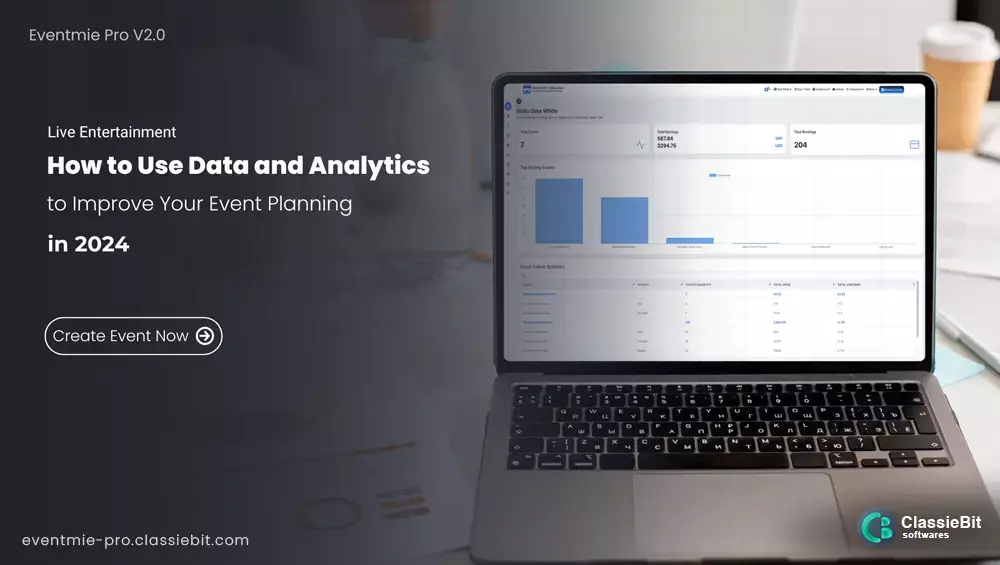
How to Use Data and Analytics to Improve Your Event Planning in 2024
Elevate your event planning in 2024 with data-driven insights. Discover how to leverage analytics to optimize event experiences, maximize ROI, and drive success. Get the strategies you need to plan unforgettable events that wow attendees. Purchase Now!
In today's rapidly evolving event industry, the role of data and analytics has become more crucial than ever. As we step into 2024, event organizers, planners, and managers are increasingly turning to data-driven strategies to enhance their event planning processes. From gaining deep insights into audience preferences to predicting industry trends and optimizing resource allocation, leveraging data can lead to more successful and memorable events. This blog will explore how you can effectively use data and analytics to improve your event planning, ensuring your events not only meet but exceed expectations in the coming year. Join us as we delve into the transformative power of data and analytics in the world of event planning. This blog will guide you through the importance of data and analytics in event planning and introduce you to the Best Event Planning Platform in 2024.
Understanding the Importance of Data in Event Planning
Data-driven event planning involves collecting and analyzing information to make informed decisions. This process helps in understanding your audience, predicting trends, and measuring event success. Here are some ways data can enhance your event planning:
1. Audience Insights: By analyzing demographic data, past attendance records, and social media interactions, you can gain a deeper understanding of your target audience. This helps in creating personalized experiences that resonate with attendees.
2. Trend Prediction: Data analytics tools can help identify emerging trends in the event industry. Staying ahead of the curve allows you to incorporate the latest trends into your events, making them more appealing and relevant.
3. Resource Allocation: Efficiently allocating resources such as budget, staff, and materials is crucial for successful event planning. Data analytics can pinpoint areas where resources are being underutilized or overspent, allowing for better management.
4. Marketing Effectiveness: Analyzing marketing data helps determine which channels and strategies are most effective in reaching your audience. This ensures that your marketing efforts are targeted and yield a high return on investment.
5. Feedback and Improvement: Post-event surveys and feedback forms provide valuable data on attendee satisfaction. Analyzing this feedback helps in identifying areas of improvement for future events.
Leveraging Analytics for Event Success
Analytics tools are invaluable in transforming raw data into actionable insights. Here are some key analytics techniques to improve your event planning in 2024:
1. Real-Time Analytics: Monitoring event data in real time allows for immediate adjustments. For instance, if a session is overcrowded, you can quickly reassign space or add extra sessions.
2. Predictive Analytics: This involves using historical data to forecast future outcomes. Predictive models can help estimate attendance numbers, potential revenue, and necessary staffing levels.
3. Behavioral Analytics: Understanding attendee behaviour through data such as website interactions and mobile app usage can provide insights into what attendees value most about your events.
4. Sentiment Analysis: Analyzing social media mentions and feedback can gauge public sentiment towards your event. Positive sentiment indicates success, while negative sentiment highlights areas for improvement.
Choosing the Right Platform: Eventmie Pro
To fully leverage data and analytics in your event planning, it's crucial to choose a platform that offers comprehensive data management and analytical capabilities. Eventmie Pro stands out as the Best Event Planning Platform in 2024. Here's why:
1. Comprehensive Data Management: Eventmie Pro allows you to collect and manage all your event data in one place. This includes attendee information, ticket sales, feedback, and more.
2. Advanced Analytics Tools: The platform offers robust analytics tools that provide real-time insights, predictive models, and detailed reports. These tools help you make informed decisions and optimize your events.
3. Customization and Flexibility: Eventmie Pro is highly customizable, allowing you to tailor the platform to your specific needs. Whether you're organizing a small seminar or a large conference, the platform adapts to your requirements.
4. Seamless Integration: Eventmie Pro integrates seamlessly with various other tools and platforms, ensuring that your data is always up-to-date and easily accessible.
5. User-Friendly Interface: The platform's intuitive interface makes it easy for event organizers, planners, and managers to navigate and utilize its features effectively.
Conclusion:
As we venture into 2024, the integration of data and analytics into event planning is no longer a luxury but a necessity. By leveraging data, event organizers, planners, and managers can gain valuable insights into their audience, predict trends, optimize resource allocation, and enhance marketing effectiveness. The ability to make data-driven decisions transforms the event planning process, leading to more successful and impactful events. Choosing the right platform to manage and analyze your data is crucial. With its comprehensive data management capabilities and advanced analytics tools, Eventmie Pro stands out as the best event planning platform in 2024. It empowers you to harness the full potential of data and analytics, ensuring your events are not only well-organized but also exceed attendee expectations. Incorporate data and analytics into your event planning strategy and experience the difference it makes. Elevate your events with informed decisions and innovative solutions, and let Eventmie Pro guide you to new heights of event success.
